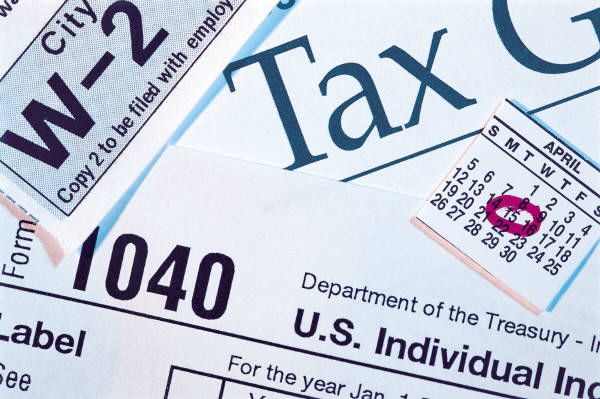Quote of the Day
There have been so many changes to the tax code over the past decade that it is now 10 times the size of the Bible, but with none of the Good News.
That is how House Ways and Means Committee Chairman Dave Camp begins an article this morning in the Wall Street Journal on our “appalling tax code.” Camp is releasing a plan today that would make the tax code simpler and fairer.
Camp's release comes at that time of the year when we are all assembling tax documens and thinking about how impossibly difficult it is to deal with not just with our tax burdens but with figuring out how much we owe. Raise your hand if you will be able to do your own tax forms for the IRS this year.
This complexity of the tax code is expensive to each and every one of us—whether you have your own accountant or patronize a service, you’ll pay a big chunk of money just for the privilege of getting the forms filled out: $168 billion is the amount of money Americans reportedly pay annually to have these mystifying forms prepared.
With three more years of President Obama, whose propensity to raise taxes is well-known, maybe this doesn’t seem the time to begin serious tax reform. But both Camp and former senator Phil Gramm, writing yesterday in the Wall Street Journal with Mike Solon, a former adviser to Senator Mitch McConnell, see glimmers of hope.
Gramm and Solon take hope from something Democrat Ron Wyden, new chairman of the Senate Finance Committee, said recently. Mr. Wyden said that the Congressional Budget Office had “committed” to him that it would "actually score pro-growth tax reform as generating revenue." Why is this so important?
This is a breakthrough. Until now, the refusal of Senate Democrats to recognize a revenue dividend coming from a pro-growth tax code has been the biggest stumbling block to comprehensive reform.
Two major hurdles remain: the president's position that he would rather lose federal revenues and economic growth than "unfairly" lower tax rates, and Democrats' misplaced perception of the importance of the inequality debate to their efforts to hold the Senate.
Even so, Mr. Wyden could become the first Democratic champion of pro-growth tax reform since Dick Gephardt and Bill Bradley helped push through the successful tax reform in 1986.
Recognizing that government can be a beneficiary from pro-growth tax reform makes it possible for Mr. Obama to get more revenues without Republicans having to vote for a tax hike. This is the glue that makes a bipartisan deal possible.
The real driver behind this breakthrough is a series of recent CBO reports showing how slower growth is bleeding the federal government of trillions in revenues.
Even Scrooges such as myself, who would like the federal government to gobble up less money (thus having fewer resources with which to intrude into our daily lives), can see why this is so key to creating a rationale for tax reform.
The Democrats in Congress have consistently based their economic programs on rosy economic projections. That these projections are not proving realistic is hampering both the ability of the federal government to raise revenues—and harming citizens who would have jobs and better incomes if the economy were stronger. Gramm and Solon write:
The only practical way to recapture these revenues is through a faster-growing economy. Mr. Wyden's recognition that tax reform can raise revenue by boosting economic growth provides the best chance this country currently has of returning to more normal rates of economic growth.
Rep. Camp notes that our nearest neighbors, Canada and Mexico, have been revising their tax codes lately with an eye to improving their economies. Of the code he is putting forward today, Camp writes:
First, the tax code will be made simpler—so every family can do its own taxes confidently, without fearing an audit, or wondering if someone else who can afford an expensive accountant is getting a better deal. …
Second, the tax code will be made more effective and efficient by getting rid of special-interest handouts, which will mean lower tax rates for individuals, families and all businesses. Under this plan, over 99% of tax filers will face a top tax rate of 25%—allowing small and large businesses alike to expand operations, hire new workers and increase benefits and take home pay. On the individual side, there will be an introductory bracket of 10%. …
Third, make the tax code fairer and more accountable. That means no more hidden provisions that benefit a favored few, and no more tax increases to fuel more spending.
…
The tax code changes in my plan are not intended as a means of raising revenue. If loopholes are closed, Americans should get the benefit by way of lower rates.
Tax reform needs to be about strengthening the economy and making the code simpler and fairer. That's what Republican President Ronald Reagan did when he worked with Democrats in Congress in 1986. We need to get to work and repeat that success.
President Obama sees the tax code as performing an entirely different task—he sees it as a vehicle for reducing inequality. Never mind that his policies have enlarged the gulf between the affluent and the poor like no other administration’s in history!
Still, the economically disastrous policies of the Obama years may actually make the public more open to changing the tax code in a way that promotes the creation of jobs and upward mobility.


